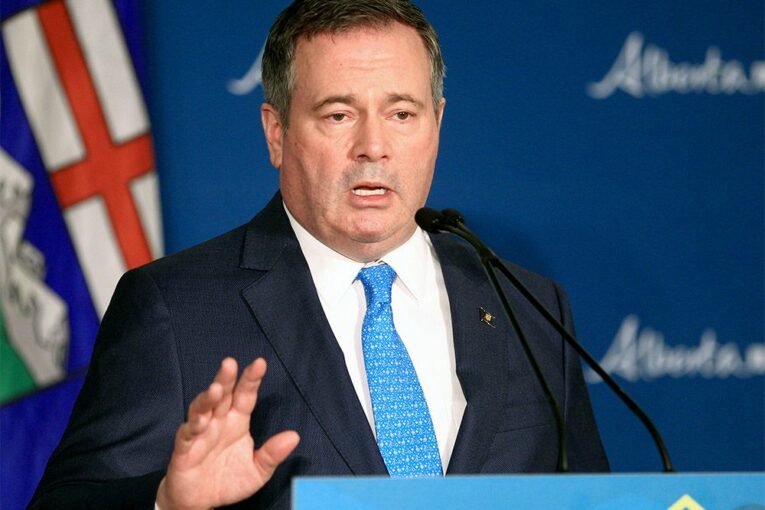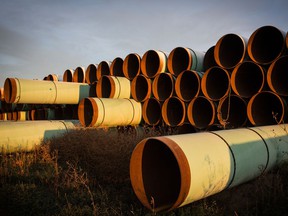
Premier Jason Kenney hasn’t shut the door on making future investment in a revived Keystone XL — if it was embraced by the United States — and says Alberta could be in for another energy boom with higher prices.
In an interview after addressing the CERAWeek S&P Global energy conference in Houston this week, Kenney also spoke about the need to redefine ESG to include security of supply concerns, and the ability of Alberta producers to help fill the gap after the United States government banned Russian oil imports.
Herald business columnist Chris Varcoe spoke with the premier Tuesday evening. Here is a transcript of the conversation, edited for space and clarity.
Q: If we take a step back, how monumental is what we’ve seen in the past week or two for oil and gas markets?
Kenney: I think it’s an earthquake . . . It is, I think, the beginning of a potential global realignment in how we supply energy. It has turned the whole concept of ESG (environmental, social and governance considerations) on its head.
And I think maybe governments and investors around the world realize they’ve been missing the boat by turning a blind eye to the nature of the regimes that produce most energy in the world.
So I think this is a paradigm shift . . . I was meeting with folks from a couple of oilsands companies who said that all of a sudden, they’re almost overnight getting a dramatically more constructive tone from European financial institutions.
Q: What do you think this means for the Alberta energy sector?
A: It means that we have to up our game. It means there is going to be growing global demand for our products, both in the short and long term — (in) the short term to backfill the growing strike on Russian oil.
If the pipeline companies get busy with optimization and reversals in the U.S. pipeline system, we could potentially ship 200,000 to 400,000 additional barrels a day to U.S. refineries. Then, of course, short to mid-term, you’ve got TMX (the Trans Mountain pipeline expansion under construction).
In the short term, we could conceivably see Canadian or Alberta exports go up by a few hundred thousand barrels a day. But then in the long term, I think it also changes the economics.
The question is, will the politics change? Will Washington get serious about this? Will they realize that their best, their safest and most sensible bet is on Canadian, and not Venezuelan, Saudi or Iranian energy?
Q: You said Canadian producers need to up their game. What do you mean? How do you get them to produce more when there’s a mantra from investors who don’t want to see them spend more to increase output?
A: We’re not talking about huge new multibillion-dollar greenfield developments in the next few months, obviously. We’re talking about efforts to marginally increase production from existing assets.
Some marginal production is possible from our oilsands producers, but (also) among the small and mid-cap conventional producers.

Q: You’ve spoken recently about TC Energy and the KXL pipeline in the context of the United States. Have you had any direct conversations with TC Energy about what it would take to get them interested in reanimating that project? (The province sank $1.3 billion into the TC-led project to see construction started before the cross-border permits were cancelled by U.S. President Joe Biden last year.)
A: No, not lately. I think they’ve made it clear that they’ve kind of washed their hands of the project.
Having said that, there are some stranded assets out there. There are pipe stations that have been built. There is some pipe that has been strung, the engineering work that’s been done, the advanced regulatory work and so much more. There are real assets there.
And I just think if there’s a will, there is a way. And that may not be TC Energy, but we would entertain discussions with the U.S. government and other partners about how to de-risk a project like that.
Now, nobody’s going to do that unless and until they see a policy decision in Washington, and clearly that’s not the case now.
Q: Do you think your government, and maybe the Canadian federal government, is going to have to do something more dramatic to get new LNG projects built? Does that include potential public investment in LNG projects to get them going?
A: Well, I wouldn’t discount that. The government of Canada stepped in to de-risk TMX when Kinder Morgan bailed. We stepped in to de-risk KXL when TC Energy couldn’t finance it completely.
As I’ve said, I think maybe the way forward on a son, a successor, to KXL could be some kind of joint public participation. This is infrastructure, after all. And it’s infrastructure that generates, that spins off billions and billions of dollars of revenue, of royalties, of taxes and a lot of jobs.
So we keep an open mind about that. We would never rush into something like that.
Q: Let’s go back to Keystone XL. If we talk about the son of KXL, could you envision your own government getting back in and putting another round of investment — or put more investment in — to de-risk that project, if you could get it to go?
A: If that’s the only way we could revive a project with that, I would leave the door open to that possibility. But we would much prefer that it happen with private investment.
But at the end of the day, we had calculated that project would be worth something like an additional $20 billion of net revenues to the government of Alberta . . . There is a very compelling economic and fiscal interest that Alberta has in that project.
Q: Do you think we are in a new era of higher oil and natural gas prices? If so, what does that mean for Alberta?
A: It will mean more jobs and more investment, more tax revenue and an improvement in our fiscal situation. It also means population growth . . . We should see this as an opportunity. And who knows, maybe it’ll be the last energy boom.
This time, let’s make the right decisions. Let’s put the pedal to the metal on diversification. Let’s not spend the surpluses, but let’s focus on getting our debt back down, so we’re better positioned for a long-term future.
You can read more of the news on source
